
Talking to our aging parents about their finances can be a tough conversation. But there are ways to educate and protect our parents from being taken advantage of by scammers, charities, and other organizations without being seen as controlling or overstepping.
Today’s guest is Cameron Huddleston. Cameron is an author, speaker, and award-winning financial journalist. She’s the Director of Education and Content at Careful, the first service built to protect and monitor aging adults’ daily finances. Cameron’s work has appeared in a number of publications including Forbes and The Chicago Tribune.
“Warn your parents about these red flags because there’s no way to keep them updated on every new scam that’s out there.” - Cameron Huddleston Share on XShow Notes:
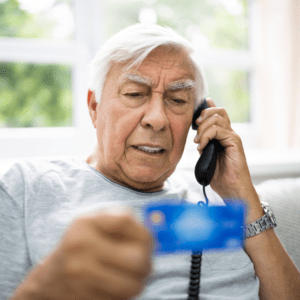
- [1:09] – Cameron described the experience of caring for her mother with alzheimers. She had not had a conversation with her about her finances.
- [2:37] – Talking to your parents about scammers is a way to open the door to more conversation about finances.
- [5:13] – Warn your parents about red flags because there’s no way you can keep them updated on every single scam.
- [6:29] – As we age, we all experience some level of cognitive decline.
- [7:38] – Get an idea of how they are doing now so that you will be more aware of changes.
- [8:56] – You’re not trying to pry or be nosey. This is a series of conversations that open the door to communication about finances for the future.
- [10:00] – Older adults are more likely to be exploited by someone they know.
- [11:10] – Nothing has to happen right now except the beginnings of conversations. Cameron lists some things to have in order later.
- [13:07] – There are things you can do to help prevent a caretaker from taking advantage of your parents.
- [14:35] – There are some red flags to listen for in conversations with your aging parents and/or their caretaker.
- [15:43] – If you are concerned about your parent’s credit or finances, you can have their credit frozen and you can monitor everything for safety.
- [16:58] – Your parents can also sign up for services while they are healthy and add you to the monitoring account for notifications.
- [18:39] – Cameron shares an experience with her own mother. She was a giving person but with her alzheimers, she wound up donating money frequently.
- [19:51] – How can you help them get the spending on charity donations under control?
- [22:21] – One piece of advice for parents is to let all calls go to voicemail and don’t call the numbers they called from.
- [24:21] – Chris describes an unusual and suspicious new text scam. How can we warn parents about the things that are out of the norm?
- [27:00] – If you have a parent with dementia, these warnings won’t always do much good. Leave notes and reminders for them.
- [28:26] – Cameron describes a situation with her mother and she realized that she was no longer safe to live alone.
- [31:09] – There are a lot of things that parents can have in place in writing while they are relatively young and healthy.
- [32:33] – Cameron has a lot of great resources on her website CameronHuddleston.com.
Thanks for joining us on Easy Prey. Be sure to subscribe to our podcast on iTunes and leave a nice review.
Links and Resources:
- Podcast Web Page
- Facebook Page
- whatismyipaddress.com
- Easy Prey on Instagram
- Easy Prey on Twitter
- Easy Prey on LinkedIn
- Easy Prey on YouTube
- Easy Prey on Pinterest
- Carefull Website
- Cameron Huddleston’s Website
Transcript:
Cameron, thank you so much for coming on the Easy Prey Podcast today.
Thank you so much for having me.
Can you give me and the audience a little bit of background about who you are and what you do?
Sure. I'll try to wrap it up in a really short nutshell because it's kind of long. I have been a personal finance journalist for more than 20 years. I've written for a variety of publications, including Kiplinger's and Forbes.
In 2008, my mother was diagnosed with Alzheimer's disease. She was 65. I was 35 and still had very young kids at home, and I had to become her caregiver. She lived with Alzheimer's disease for nearly 13 years.
That experience prompted me to write a book that came out in 2019 called Mom and Dad, We Need to Talk: How to Have Essential Conversations With Your Parents About Their Finances, because I did not have essential conversations with my mom about her finances before she started experiencing memory loss. I had to scramble. I had to play detective.
I want people to realize that they need to have these conversations sooner rather than later. -Cameron Huddleston Share on XI want people to realize that they need to have these conversations sooner rather than later. I want people to realize that these conversations are not nearly as scary as you might think they are. That's my story in a nutshell.
Awesome. Let's talk a little bit about what are the things that we have to be careful of for our parents in terms of scams and frauds. How do we talk to them? How do we prepare for those situations? How can we hopefully make those transitions of us taking more responsibility for their finances and them less responsibility?
Actually, talking to your parents about scams is an easy way to open the door to more conversations about their finances because we all are targets of scammers. Obviously, they are targeting older adults because they see them as easy prey, but you and I are getting calls, people in their 20s are getting calls, and scammers go after everyone, so it's an easy way to start the conversation by saying, “Hey. I got a call the other day from someone claiming to be with the IRS. They said that I owe back taxes. If I don't pay right away, go get a gift card at Target, and give them the number, then they're going to send a police officer to come arrest me.”

Maybe you got a phishing email or a text message. Oh my gosh, the text messages, I get them all the time now. AT&T is telling me that I paid my bill on time, so click to get a special gift. Amazon is telling me that my account is being suspended. You've got an example of a scam. You have to have one. I know you do because we all do.
You go to your parents and say, “Hey. I got this text message. Did you get something like this?” “Hey. I just got this email.” “Hey. I just got a phone call. I wanted you to be aware of it and I want you to know it's a scam.”
No legitimate organization is going to ask you to wire money. -Cameron Huddleston Share on XThen, you can start talking about those other scam red flags like the request to use a gift card to make a payment or the request to wire money. No legitimate organization is going to ask you to wire money. It's not going to ask you to go to Target to get a gift card. The IRS is not going to tell you to go to Target to get a gift card to pay your tax bill. It's just not going to happen.
The IRS is not going to tell you to go to Target to get a gift card to pay your tax bill. -Cameron Huddleston Share on XAlso, the IRS is not going to call you. Government agencies typically will not call you. They communicate by mail. They're not going to call unless there's already a conversation that's been going on. There's been a back-and-forth between you and Medicare or you and the Social Security Administration. They're not going to call out of the blue asking for personal information or payment.
Let your parents know this. Let them know that if you ever get an email, even if it looks like the email is coming from a bank or some company that you've done business with and it's telling you to click on a link, don't click on the link. Call your bank directly and say, “Hey. I just got this email. Is there a problem with my account?”
The same goes for text messages. Don't click on links in text messages. Again, reach out to the company directly and see if there's an issue.
Warn your parents about these red flags because there's no way you can keep them up-to-date with every new scam that's out there. It's so important to start having these conversations and keeping the lines of communication open so that your parents feel comfortable coming to you if they get a suspicious email and they get a call. Because if they don't feel comfortable coming to you, then they could be giving their money away. You don't know. They’re embarrassed now that they have become a victim, and the problem just gets worse and worse. They need to feel comfortable having these conversations with you. It's a really good way to protect them as they get older.
I suppose this goes well beyond just the warnings of scams and whatnot but just having a better understanding of our parents' finances in general—what accounts, where they have accounts, and how to access those accounts.
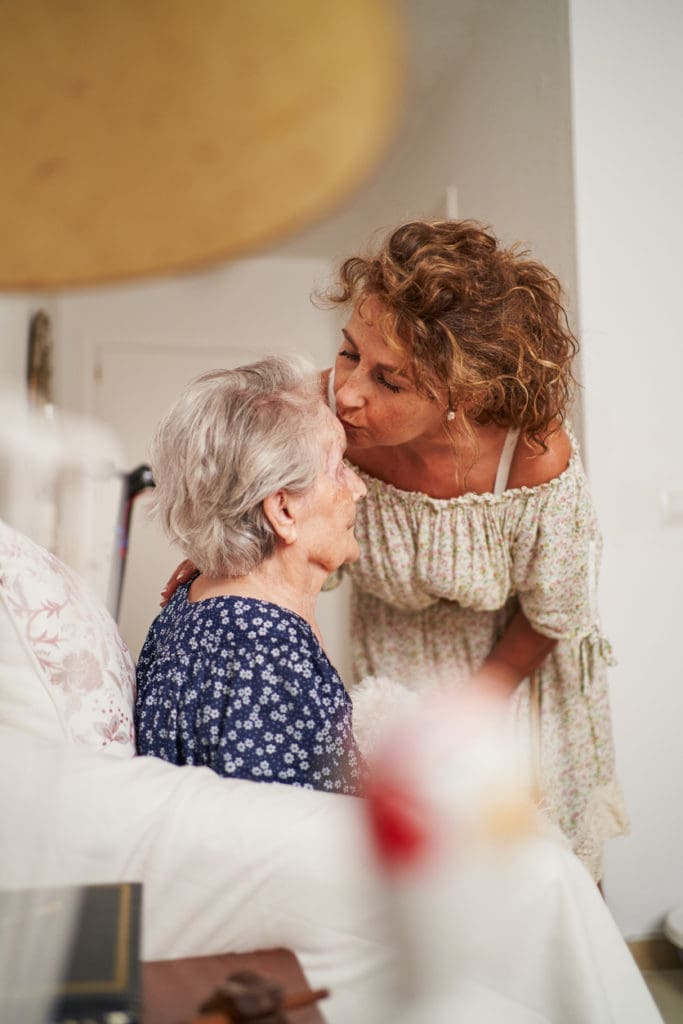
Certainly. It's really important to have these conversations because this is a great way to help protect your parents from all types of financial exploitation and fraud down the road.
I know a lot of people aren't going to want to hear this, but as we age, we all experience a certain level of cognitive decline. I'm not talking about dementia or Alzheimer's disease. That is certainly severe cognitive decline.
As we age, we are all going to experience a decline in our ability to manage our finances and make informed financial decisions, so if you can start talking to your parents while they are still healthy and relatively young about their finances, get a general idea of where they stand financially, what sort of assets they have, what sources of income they have, and if they have debt.
You don't need to know dollars and cents. You don't need to know how much you have in the bank. You don't need to know how much you owe to Visa on your credit card. But do you have credit card debt? Do you have mortgage debt? Are you still paying off the student loans that you took out to pay for my college?
Getting a general sense of where they stand financially and opening the door to sharing information is going to give you an idea of how they're doing now so that if things change, you're going to recognize those changes. You're going to notice that maybe mom is having trouble paying the bills because there's a pile of unpaid bills and collection notices sitting on the kitchen counter. You know that in the past, Mom's always been on top of her finances.
If mom is talking about donating money and she's really getting loose with a checkbook and writing checks to every organization that asks for money, that's going to be a red flag to you that something has changed, something is off, and maybe you need to start getting involved. Getting a good idea of where they are now financially is going to help you be aware of changes in their financial behavior as they age.
It's important to let your parents know when you're having these conversations that, “Hey, look. I'm looking out for your best interest. I want this information so that if you ever need help from me, I can help you. I want to know what your plans are and what your wishes are so that I can follow through on those wishes and make sure that your money is managed in a way that you would want it to be managed if something ever happened to you.”
Let them know you're looking out for their best interest. You're not trying to pry. -Cameron Huddleston Share on XLet them know you're looking out for their best interest. You're not trying to pry. You're not trying to be nosy. You don't need all the details, but you need some information.
This is a series of conversations. Don't grill your parents. -Cameron Huddleston Share on XThese conversations don't have to happen over five hours one day. This is a series of conversations. Don't grill your parents. That's not going to be fun for them and it's not going to be fun for you. But just opening that door to having these conversations is really a good idea.
As parents age—and maybe it's part of the same conversation literally—I know that often, caretakers sometimes become scammers in a sense. They take advantage of our parents when they're aging. “Oh, don't worry. I'll handle and pay your bills for you.” As they're siphoning off money to themselves, how can we as children help watch out for that and make sure that's not happening?
In fact, older adults are more likely to be exploited by someone they know. -Cameron Huddleston Share on XI'm glad you brought that up because it is a huge issue. In fact, older adults are more likely to be exploited by someone they know. That might be a family member, a friend, or a paid giver who is in the house.
When you're having these conversations with your parents while they are healthy and relatively young, you want to make sure that they have some essential legal documents. You want to make sure they have a will or a trust, something that spells out who gets what when they die.
But even more important is to make sure they have a power of attorney. This should be a general durable power of attorney so that it remains in effect even if they become mentally incapacitated. What a power of attorney does is it lets you name someone to make financial decisions and financial transactions for you if you can't.
Your parents might be like, “Well, I'm not ready to give someone that much power right now.” What you can say to them is, “Hey. You want to do this now while you're in control so that you get to decide who is going to make financial decisions for you. You want to meet with an estate planning attorney and name your power of attorney. If it's me, mom and dad, I need to know that you named me. You don't have to give me the document right now because, really, I don't have any power without that document. I can't call up your bank and say, ‘Mom and dad named me their power of attorney. I need access to their bank account.’”
You have to have the documents, so tell them, “Look. Hang on to it. Tell me where you put it and under what circumstances I can access it.” That lists the maintain control. Really, this is all about control—parents not wanting to give up that control.
They also need to have medical power of attorney, someone who can make medical decisions for them if they can't. They need a living will. It's also called an advanced directive. It spells out what sort of end-of-life medical care they do or do not want because you don't want to have to decide whether to keep them on life support. That should be their decision. It needs to be in writing so the doctors know what their wishes are. It needs to be in writing so the family knows what the wishes are so that they're not in court fighting over whether to keep mom on life support.
Make sure they have these documents. This is so important. This is the first step to protecting your parents against exploitation as they age because if you had been named power of attorney and now mom and dad have dementia, you can go to the bank and say, “I have my mom's power of attorney.”
Then, if someone else shows up and comes down with a new power of attorney document because they persuaded mom and dad to name them as power of attorney, they'd be like, “No, wait. I have their son, John, on file as the power of attorney. I have their daughter, Sally, on file as a power of attorney.” That's going to sound off alarm bells for the bank or the financial institution if they've already got that power of attorney on file.
If your parents are at home alone with a caregiver, take all of the important financial documents out of the house. -Cameron Huddleston Share on XIf your parents are at home alone with a caregiver, take all of the important financial documents out of the house. Make sure there aren't Social Security cards lying around. Make sure there aren't credit cards lying around. Give that caregiver cash or a prepaid credit card to run errands for your parents. These are just some more ways to protect them from being taken advantage of.
Make sure you're checking in on your parents. Maybe that means putting a camera in the house. That means calling your parents and visiting your parents. If you don't live in the same town and can't visit them, have a family friend or a neighbor who's checking in because you don't want your parent to be isolated, because if they're just listening to the voice of one person and that one person is trying to manipulate them, then soon, you're going to start calling and the caregiver is going to say, “Oh, well, mom can't come to the phone right now.”
They give you the update and you don't know what's really going on. You've got to stay in communication with your parents, check on them regularly, or have someone else who's checking in on them.
The question I was going to ask is what do we do if it's the caretaker or caregiver who's answering the phone? Definitely one of the things that scammers do in romance scams is, “How can I isolate people? How can I keep them away from people that are going to give them good advice, people that are going to warn them about things, and people that are just going to ask them questions?” How do we know at what point the caregiver has switched over from taking care of them to taking advantage of them?

If the caregiver is not letting you talk to your parents, or if you are talking to the parent, but the parent is saying things like, “I don't think you love me anymore. You don't care about me,” or, “My caregiver, Jane, is the one who's here taking care of me….” Of course with dementia, there can be paranoia and your parent might naturally feel like you have […] to them if you're not the one caring for them, but if you're hearing statements like, “You don't love me, but my caregiver loves me”—especially if you hear this—“My caregiver is saying you don't love me,” then yes, that's a big red flag that the caregiver is trying to influence your parent.
If you need to be monitoring your parents' finances too, you need to be with that power of attorney. You can use it to access their bank accounts. You need to be checking their bank accounts, their credit card accounts, and any sort of retirement accounts to make sure that there aren't unusual transactions.
If you can, set up alert transactions on those accounts so you can be notified. Freeze your parents' credit so that new accounts can't be opened in their name. Sign them up for credit monitoring and identity monitoring so they're alerted if there are changes to their credit report.
I'm going to throw this out there. It's a shameless plug for Carefull, which is the company that I work for. Carefull is an account-monitoring service. It also provides credit and identity monitoring. You can sign your parents up for the service and link all of their financial accounts. Not only is it going to monitor for those things that banks will particularly monitor for like a low account balance, but it's going to let you know if there are duplicate payments on purchases, late and missed payments on bills, if your parents aren't paying bills because the caregiver is stealing money from them, unusually large transactions, or income that hasn't been deposited. It's going to look for a whole range of unusual transactions and money mistakes, and then you can get alerts.
Your parents can get alerts too. If your parents are still independent, they can sign up for the service for themselves. If they want, they can add you as a trusted contact and they can decide what level of access you get. It's view only, but they can decide that maybe you only get to get account alerts. You don't get to see everything that's going on.
I hadn't thought about the monitoring for duplicate transactions. I've talked to other people about accounting fraud. That's what people will do. It's like, “Well, we know there's always this, so we do it twice.” No one notices because that's the transaction we are expecting.
Certainly. If you have a parent who is starting to experience memory loss, that can be an early sign. They might not realize that they bought that present for their granddaughter on Amazon yesterday, and now they're buying it again. They're buying it again or they're paying bills twice.
If they're getting alerts that they have already paid this bill, then hopefully, that's going to help them realize, “Oh, wait. I just paid that bill, what's going on? Then, of course, if they've granted you access to get alerts too, then you're going to know that something's going on.

Do you have any specific tips for helping people to deal with our parents giving money to people soliciting donations? I know that when my grandparents were aging, that was something that my parents were particularly concerned about. They had started to give more money to charitable organizations. It turned out to be legitimate, and that's what they wanted to do, but there was at least that concern of, “Well, are these institutions predatory in the way that they're interacting with them, or was it something that they were voluntarily doing?”
I'm glad you asked this because this was a really big issue with my mom. When she was still living on her own after she was diagnosed with Alzheimer's disease, she was writing checks left and right to every organization that asked for money. She was a giving person, but she was giving money to organizations to which she had no ties. All they had to do was send a letter or call her and say, “Hey. Will you donate some money?” And she did.
Here's how I knew this. I would visit her frequently and we would go through her mail. I would see lots of these requests. If your parents are getting the request, that probably means they've already been giving money. They've already gotten on the list. If you see the gifts that charities typically send—maybe a calendar, a pen, or stationery—and it's in the house, that means your parents have been giving money.
If you see the gifts that charities typically send and it’s in the house, that means your parents have been giving money.-Cameron Huddleston Share on XActually, she had not set up online access to her bank account, so I did. I was monitoring things from behind the scenes, just keeping an eye on her spending while she was in the early stage of Alzheimer's disease, and I could see that she was writing checks to these organizations.
How do you get that under control? Have a conversation with your parents. Ask them what their giving priorities are and what organizations and causes they care about most, make a list, create a budget for giving, and then say, “OK. You really want to give money to the Humane Society. This is how much income you have. If you want to give $25 a month or $100 a year, you put on the list ‘Humane Society, $100 a year.’” Then, you encourage them to hang up that list by the phone, on the refrigerator, or by their computer. They can mark the date when they make that donation so they can keep track of it.
Then, give them a script that they can use to say no to anyone else who called. “I'm sorry. I have already given to the organizations that are most important to me. I don't have it in my budget to give to you this year.” Give them something they can say to politely hang up because oftentimes, older adults don't want to just hang up the phone. They engage—especially if they're alone—because they enjoy that conversation. If you give them that script, they can hang up without feeling bad about doing it.
If it's really getting out of hand, take away the checkbook and take away the credit card, but don't just say, “Hey. I'm taking away your checkbook. You're giving away too much.”
Here's something that I think would be better. “Here's a credit card that I think you should use. It's going to be safer.” Give them a prepaid credit card so you can limit the damage.
I like the idea of not only just listing the charities that they give to but actually allowing them to put a date next to it so they know, “OK. I already gave to them.” Even if they forget that they've given to them, they'll look at the list and see that, “Oh, OK. I did.” There are definitely times that I've given to a charity and forgot, “Was that this year that I gave it, or was it last year?” Having that right in front of my face would be helpful.
Right. You need an Excel spreadsheet that you've got on your computer that you can refer to anytime you get a call.
Yup. Any recommendations on helping our parents not fall for gift card scams?
I think certainly letting them know that if they get a call and someone asks them to pay by gift card that this is a scam. This is a telltale sign of a scam, but I think even a better approach is to tell your parents, “Don't answer the phone. Just don't answer the phone. Let all calls go to voicemail. Then, you can listen to your voicemail and decide, ‘Hey, should I return this call?’”
If it's a call that is supposedly from the bank, Social Security Administration, or whatever, call those agencies directly. Do not call the number that the person has given you. Really, that's the best way. Don't answer the phone. Usually, if it's a scammer, they're not even going to leave a message. Most of them don't.

The thing is they might think, “Oh, I recognize this number. This is from my local area code.” Let them know that scammers can spoof numbers. They have technology that makes it look like it's a number that you might even recognize, so don't be fooled by that. Just let the call go to voicemail.
Again, I then note for them. If they are starting to experience any sort of memory loss, put those notes hanging up on the kitchen cabinets, on the refrigerator, or by the phone so that they don't forget. Don't answer the phone.
I know that from a technology perspective, while it's not great in all circumstances, maybe even setting up a device so unknown caller IDs go straight to voicemail. Their cell phones won't even ring, but only people within their contacts list will actually ring through to them.
That's certainly a great idea.
I've started to get these really random text messages from people. “Hey, this is Susie. I wanted to see if you wanted to meet me at the store.” I don't know Susie.
The first time I got one of those, I was like, “Oh, you've got the wrong number.” The person was way overly apologetic. “Oh, I'm sorry for the inconvenience. I didn't mean to disturb you. Oh my gosh, I can't imagine it.”
They were so apologetic that I was like, “OK, this is already suspicious.” I'm like, “OK, whatever.” Then, a day later, I got another one. I've probably been getting several a day now of, “Hey, Bob. Do you want to go golf today?” Prior to a month ago, I'd get a wrong text message once a year or something like that.
Any suggestions on handling those things that are outside of the norm, like starting to get text messages from people that they don't know? Like you were saying earlier with the donations, sometimes, they can be lonely and want to talk with people. They grew up in an era where being polite was maybe more valued than it is today, so they feel like they want to engage, at least be polite, talk to the person, or something like that. Any suggestions on dealing with those sorts of things?
Again, you need to warn your parents that there are scammers out there who will use all sorts of methods to get to them including sending text messages, pretending to know them, and saying, “Hey. Do you want to get together?” If it's not a name that you recognize, don't respond. You don't have to respond. It's likely a scammer trying to draw you into a conversation, and it's going to get to a point where they're trying to get something out of you.
The same goes for social media. If someone you don't know responds to a post that you've made and says something like, “Oh, that's such a great picture of you. You are such an attractive woman.” Or, “I've been looking for someone like you.” Let them know to not respond to people who reach out to you out of the blue because they are likely scammers. They're not looking for love. They're looking to take advantage of you.
Don't open the door to someone you don't know. If it's someone claiming that they're in the neighborhood, they're sealing driveways, they're trimming bushes, or whatever, just don't answer the door. Let them keep on walking. That's the safest way.
Don't answer the phone. Don't respond to the text message. Don't engage with people you don't know on social media. Don't open the door. That's the best way to stay safe.
Now, if you have a parent who has dementia, of course, telling them these things isn't always going to do any good because they're likely going to forget. Put those reminder notes up again throughout the house so that they remember, because this is something that people with dementia will do for themselves.
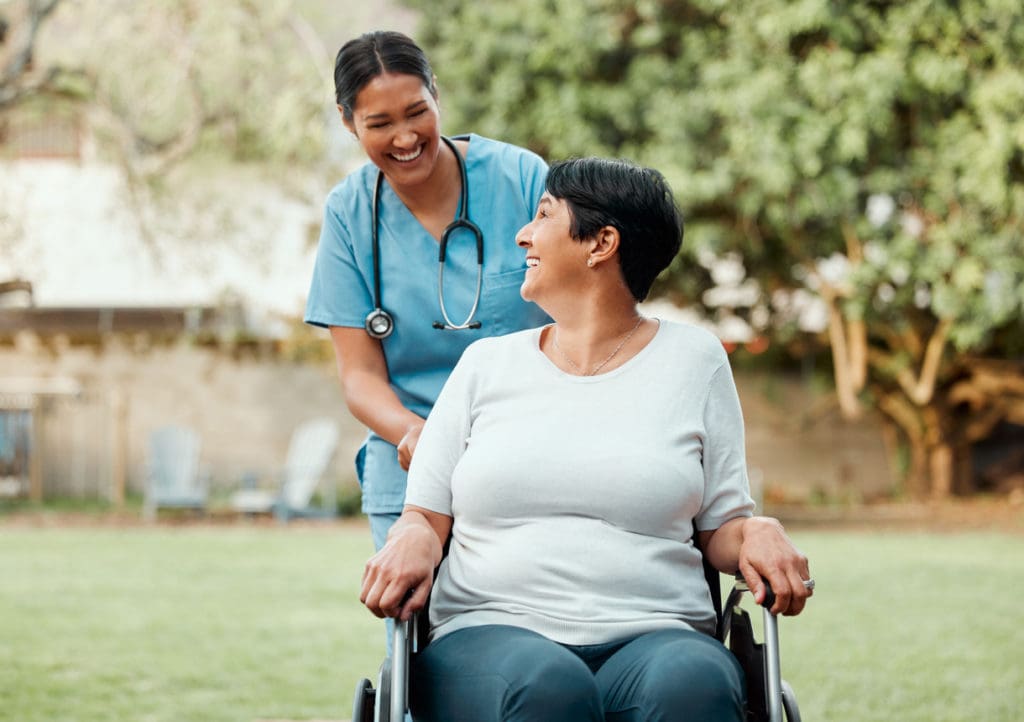
If you have a parent with dementia but they haven't been diagnosed yet, one of the early signs is reminder notes around the house. Reminding them of how to do things that seem really pretty obvious is a sign that they are forgetting things.
Put notes up for them, but once it gets to the point where they really can't be trusted to be on their own, you've got to get either someone in the house—a family member, a neighbor, a volunteer from their place of worship, or a paid caregiver keeping an eye on them all the time, because it will get to the point where even if there's a note on the door, they're still going to answer the door. They might walk out the door and might not come back, so you've got to have someone who's keeping an eye on your loved one at all times once the dementia progresses.
This is what happened with my mom. I thought she was still OK to be living on her own. I had taken away the car keys, but I had people who were coming in to take her on errands and keep her company. But one day, she got a call while she was alone from someone telling her that she had won a sweepstake and needed to wire money to claim her prize.
She actually called my uncle asking how to wire money. He calls me and says, “I just got a call from your mom. She wants to know how to wire money.” I was like, “Oh my gosh.”
I went right over to her house. Of course, the person is calling. I picked up the phone and I'm like, “Stop calling.” I had to stay there because my mom was convinced that she had won this prize and had to wire money because her financial decision-making ability had been impacted by Alzheimer's disease.
It didn't matter how much I tried to reason with her. There was no reasoning with her. I had to sit with her all day and then call a friend to come sit with her when I had to go pick up my kids to make sure that she wasn't going to get on the phone with this guy who was trying to scam her.
That was a wake-up call for me. I realized she couldn't be at home alone anymore. At that point, I moved her in with me. There does come a point when your loved one with dementia can no longer be trusted to be alone for their own physical safety and financial safety.
I think that's a very hard transition for both sides of the equation to realize that our parents can't be trusted to make decisions on their own.
Right. But it's so important because if you love your parents, you have to protect them. That means having these hard conversations, making these hard decisions, and going back to having these conversations. If you're having conversations with them while they're healthy and relatively young, then you can ask them about these situations. At what point would you be willing to perhaps move into an assisted living facility? At what point would you be willing to move in with me or allow us to hire caregivers for you? That's them telling you what their wishes are so that you're not making that decision for them.
For me, it's funny that even if these are conversations we should be having with our spouses now that we're young, one of the things that I did was made a file folder that I keep at the bank safe deposit box that has key accounts. “Here are the account numbers. Here’s what's in these accounts. Here’s how to get into them, and here's how to move the money around.” Not that we don't talk about those things on a regular basis but just having it documented somewhere that's safe and secure that she knows, “OK. I don't have to worry about this. I don't have to wake up in the middle of the night worried about this. I know there's this document out here that has all this stuff in it.”
It's a great idea.
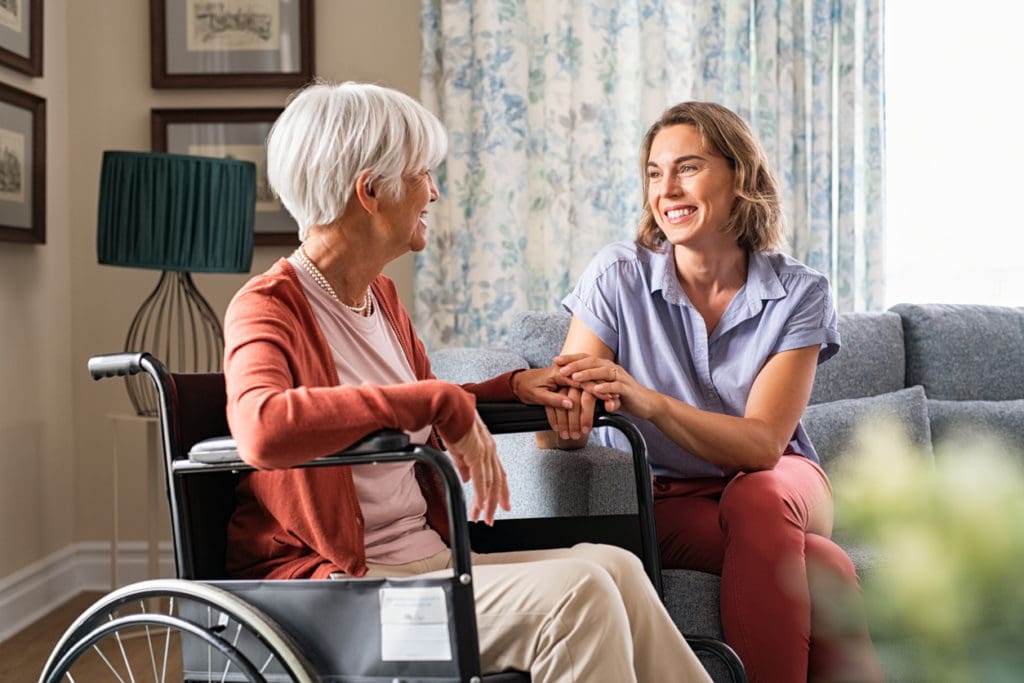
I really like the idea of the medical directives because I've heard so many people say that when mom and dad get sick, one kid is like, “Well, no. We need to do whatever we can.” One of the other kids is like, “Well, no. This is what mom wanted, but there's no document.” No one has these conversations or the conversation was only with one person, so it just really makes those kinds of things challenging if there's no documentation.
Right. I think an easy way to get the information that you need from your parents is to ask them to write it down. If they don't want to tell you details about their finances, they can put everything in writing and put it someplace safe like you did. Maybe it's a safe deposit box, a home safe, or a filing cabinet in the house with a lock on it. But you need to know how to access it in case of an emergency. It's not going to do anyone any good if no one can access it. Tell your parents to put it in writing, put it someplace safe, and tell you how to access it and when you can access it.
Yeah. There's no point in having a safe deposit box if your spouse doesn't know where the key is and that it even exists.
Exactly.
On your sites, do you have any additional resources that people can get if they have questions or want to know more?
I do. At cameronhuddleston.com, I actually have an In Case of Emergency Organizer that you can download, print out, give to your parents, and use for yourself. I have a Scam Red Flag sheet that you can print out, give to your parents, or just leave on the kitchen counter. “Here’s stuff to read and think about.” Email it to them just as a reminder of what to be looking out for.
Then, I do have some articles on my cameronhuddleston.com site. There are a lot of resources at getcarefull.com. Lots of resources there if you're an older adult on how to protect yourself and your finances and if you are a caregiver for a parent, how you can protect your parent's finances.
Awesome. We'll make sure to link all of those in the show notes. If people want to find you on social media, where can they find you?
You can find me on Instagram, @cameronkhuddleston. You can also follow Carefull at @getcarefull on Twitter, Facebook, and Instagram.
Awesome. Thank you so much for coming on the podcast today.
Thank you so much.
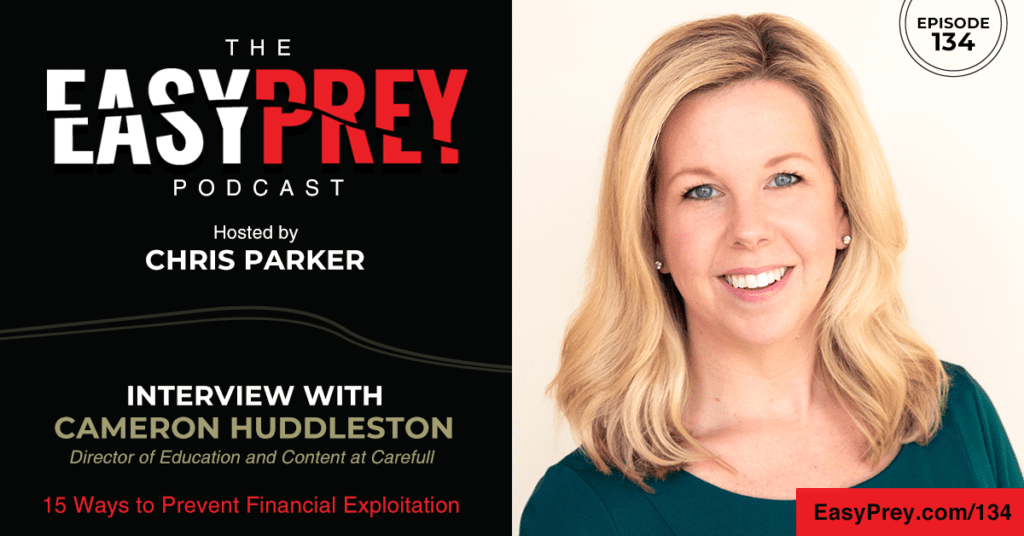

Leave a Reply